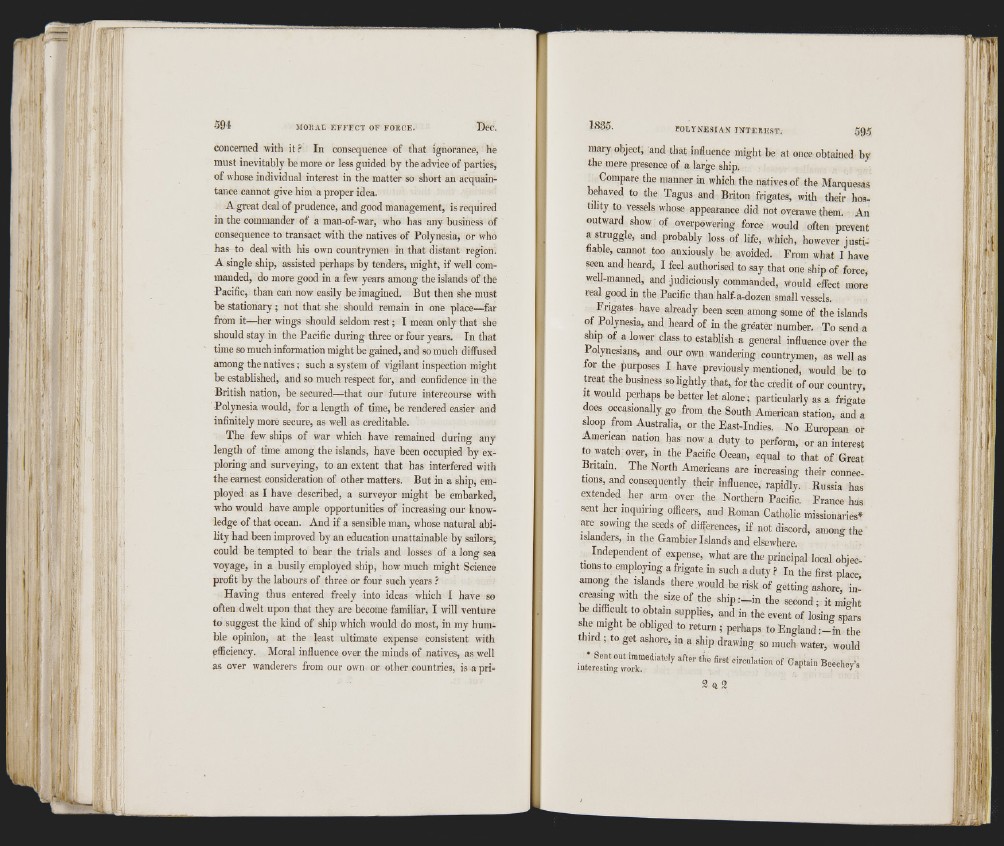
" I f 7 ;
a; '
5 9 4 MORAL EFFECT OF FORCE.
concerned with it.? In consequence of that ignorance, he
must inevitably be more or less guided by the advice of parties,
of whose individual interest in the matter so short an acquaintance
cannot give him a proper idea.
A great deal of prudence, and good management, is required
in the commander of a man-of-war, who has any business of
consequence to transact with the natives of Polynesia, or who
has to deal with his own countrymen in that distant region.
A single ship, assisted perhaps by tenders, might, if well commanded,
do more good in a few years among the islands of the
Pacific, than can now easily be imagined. But then she must
be stationary ; not that she should remain in one place—far
from it—her wings should seldom rest ; I mean only that she
should stay in the Pacific during three or four years. In that
time so much information might be gained, and so much diffused
among the natives ; such a system of vigilant inspection might
be established, and so much respect for, and confidence in the
British nation, be secured—that our future intercourse with
Polynesia would, for a length of time, be rendered easier and
infinitely moré secure, as well as creditable.
The few ships of war which have remained during any
length of tune among the islands, have been occupied by exploring
and surveying, to an extent that has interfered with
the earnest consideration of other matters. But in a ship, employed
as I have described, a surveyor might be embarked,
who would have ample opportunities of increasing our knowledge
of that ocean. And if a sensible man, whose natural ability
had been improved by an education unattainable by sailors,
could be tempted to bear the trials and losses of a long sea
voyage, in a busily employed ship, how much might Science
profit by the labours of three or four such years ?
Having thus entered freely into ideas which 1 have so
often dwelt upon that they are become familiar, I will venture
to suggest the kind of ship which would do most, in my humble
opinion, at the least idtimate expense consistent with
efficiency. Moral infiuence over the minds of natives, as well
as over wanderers from our own or other countries, is a primary
object, and tliat infiuence might be at once obtained by
the mere presence of a large ship.
Compare the manner in which the natives of the Marquesas
behaved to the Tagus and Briton frigates, with their hostility
to vessels whose appearance did not overawe them. An
outward show of overpowering force would often prevent
a struggle, and probably loss of life, which, however justifiable,
cannot too anxiously be avoided. From what I have
seen and heard, I feel authorised to say that one ship of force,
well-manned, and judiciously commanded, would effect more
real good in the Pacific than half-a-dozen small vessels.
Frigates have already been seen among some of the islands
of Polynesia, and heard of in the greater number. To send a
^ ip of a lower class to establish a general influence over the
Polynesians, and our own wandering countrymen, as well as
lor the purposes I have previously mentioned, would be to
toeat the business so lightly that, for the credit of our country.
It would perhaps be better let alone; particularly as a frio-ate
does occasionally go from, the South American station, and a
sloop from Australia, or the East-Indies. No European or
American nation has now a duty to perform, or an interest
to watch over, in the Pacific Ocean, equal to that of Great
Britain. The North Americans are increasing their connections,
and consequently their influence, rapidly. Russia has
extended her arm over the Northern Pacific. France has
sent her inquiring officers, and Roman Catholic missionaries*
are sowing the seeds of differences, if not discord, among the
islanders, m the Gambier Islands and elsewhere.
Independent of expense, what are the principal local obiec-
tions to employing a frigate in such a duty.? In the first place
among the islands there would be risk of getting ashore, increasing
with the size of the sh ip :_ i„ the second; it might
be difficult to obtain supplies, and in the event of losing spars
she might be obliged to return ; perhaps to England : - i n the
third ; to get ashore, in a ship drawing so much water, would
B e echey.
; l i t
• : I .
• V!■
"f ; '
ííl